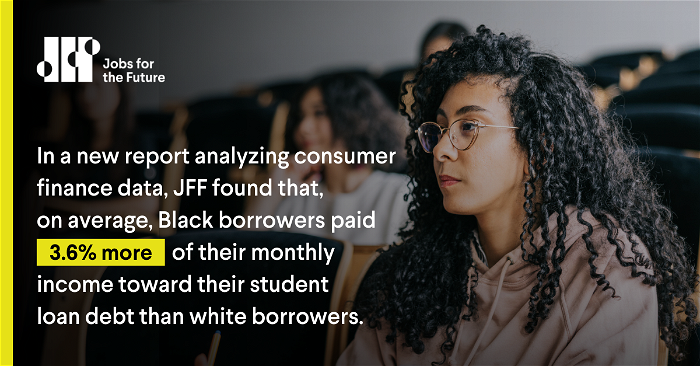
Financing the Future
February 18, 2020
At a Glance
JFF’s Financing the Future initiative reimagines the way we finance education and skills development.
Promoting economic advancement for all is JFF’s singular focus—and we’re transforming the American education and workforce systems to get there. We’re working with schools, corporations, government agencies, private markets, and philanthropies to design and scale new ways to help individuals achieve their goals.
But it’s not enough to seed boutique models that are forever dependent on philanthropy. We need to develop programs and tools that can be financed by governments, employers, businesses, and capital markets—an approach that can unlock trillions of dollars to help scale impact. By doing so, we will find new ways to close the employment opportunity gap faced by millions of individuals nationwide.
Financing the Future is a call to action to unleash the vast potential of every American by reimagining how we pay for postsecondary education and skills development.
There are no silver bullets, so we will consider an array of innovative financing options, including income share agreements, merit-based lending, social impact bonds, and individual training accounts. We’ll also explore new ways for employers to invest in their workers, new approaches to federal aid, and other strategies. In our ever-evolving economy, learners need a wide range of financing solutions to serve them throughout their lives and careers.
Financing the Future brings together perspectives from across the stakeholder spectrum, with input from educators, policymakers, investors, and learners themselves. Together, we will study innovative approaches and spur the development of new ideas that will make postsecondary education and training accessible to people of all income backgrounds.
We take a three-pronged approach to our work:
- Inform. We elevate research and knowledge about new approaches to financing education and training, tracking their evolution and performance and highlighting learner experiences.
- Guide. We work with schools, nonprofits, philanthropic organizations, employers, investors, and policymakers to explore new approaches to financing education and training and to steer investment toward promising models. We’ll also promote principles and best practices, and advocate for policy frameworks and guardrails where necessary to ensure that we meet student needs and don’t introduce new problems.
- Cultivate. We are building an ecosystem that fosters experimentation and consumer protection through more transparent outcomes data, credential frameworks, expanded career navigation services, and other complementary policies.
One of our first efforts is to explore income share agreements (ISA), an alternative model for financing higher education and training that ties the amount students pay to the amount of money they earn after completion. Hear testimonials about students’ experiences with ISAs and learn more about JFF’s work in this area on our Income Share Agreement page.
Americans cannot advance economically without continually gaining new skills, but many can’t get the education and training they need without incurring insurmountable debt. Tinkering around the margins of our existing systems isn’t enough. We must design and scale solutions that are commensurate with the nature and scope of the challenge—to help all Americans build the skills they need to thrive in an increasingly dynamic world of work.
Our team is made up of individuals who are experts in the fields of policy, impact investing, innovative finance, education, technology, workforce, human capital, economic development, and corporate consulting. Together, we bring a diverse set of experiences and skills that inform the guidance we offer corporate partners, ensuring that the impact of our work is felt across workers, businesses, and communities.
Contributors

Ethan Pollack
Senior DirectorEthan Pollack is a senior director in the Policy & Advocacy practice at JFF. He leads the Financing the Future initiative, which explores new approaches to financing postsecondary education. He tracks the evolution and performance…

Megan Soetaert
Project ManagerRelated Content

Racial Disparities in Student Loan Affordability
JFF analyzes monthly student loan repayment burdens across racial groups, finding that, on average, Black borrowers pay a greater percentage of their monthly income toward student loans than white borrowers. Key Takeaways On average, Black…

How Can Innovative Finance Transform Postsecondary Education and Training?
New Approaches to Paying for Postsecondary Education Offer Tremendous Potential Postsecondary education plays a pivotal role in helping individuals enhance their careers and adapt to changes in the job market. However, the way that we…

Exploring Racial and Gender Differences in ISA Contract Terms and Repayment Patterns
Income share agreements (ISA) have garnered significant excitement as a new tool to finance postsecondary education, but it is unclear what effect they have on racial and gender equity. Using a proprietary data set of…

Policy at JFF
JFF’s policy team offers fresh ideas on education, poverty alleviation, and workforce issues that prepare students and workers for the jobs of the future and boost our nation's economy. JFF’s policy team offers fresh ideas…

Income Share Agreements
An income share agreement (ISA) is an innovative financing tool used by education and training providers that ties the amount that learners pay to the amount of money they earn after completion. Students pay a…














